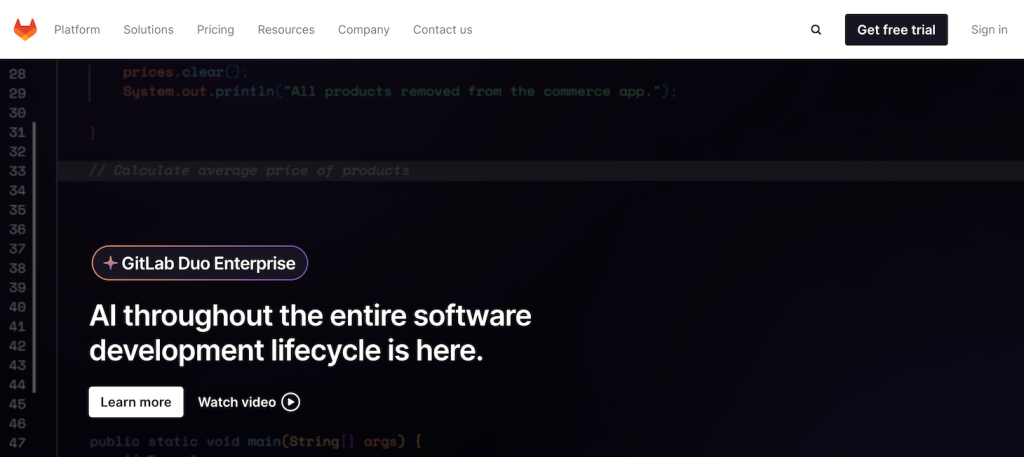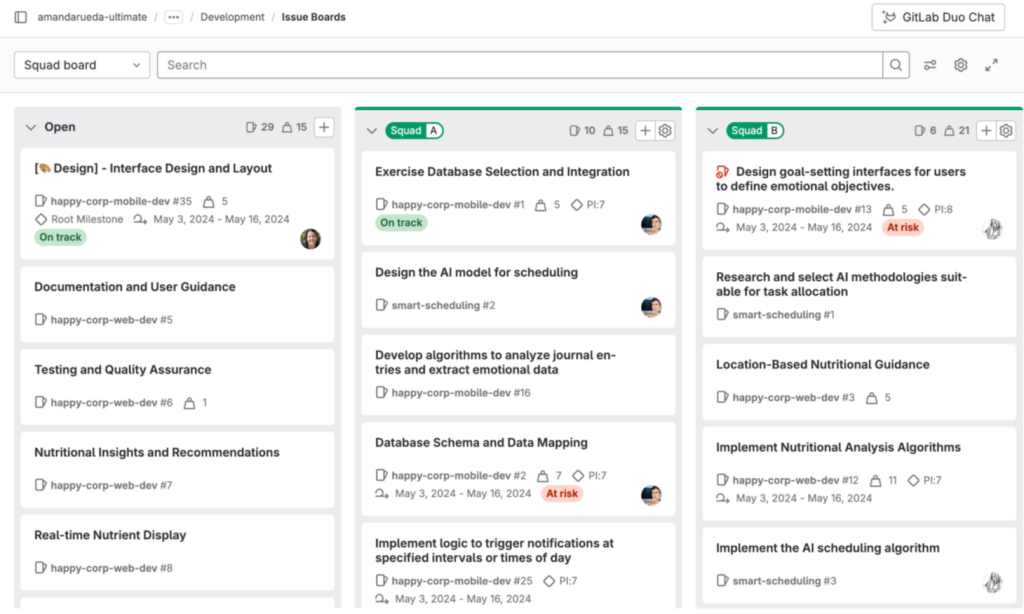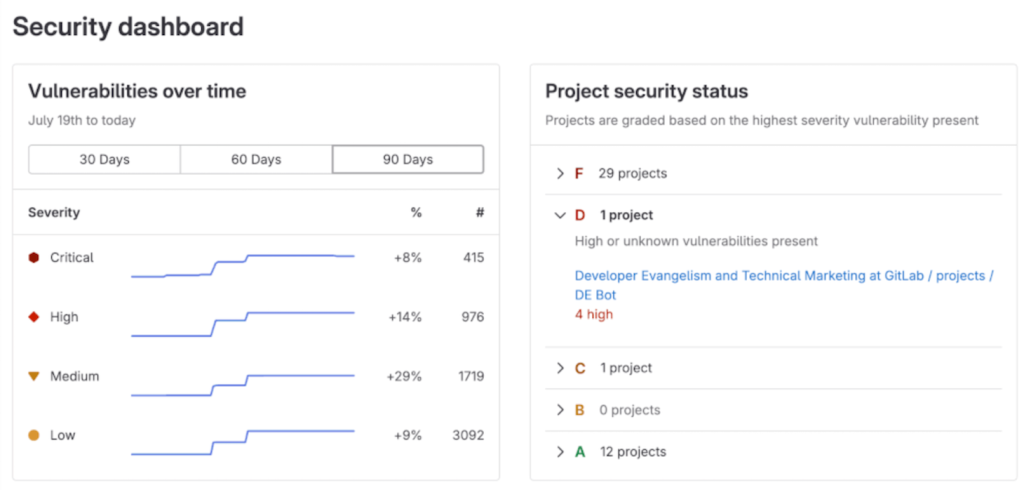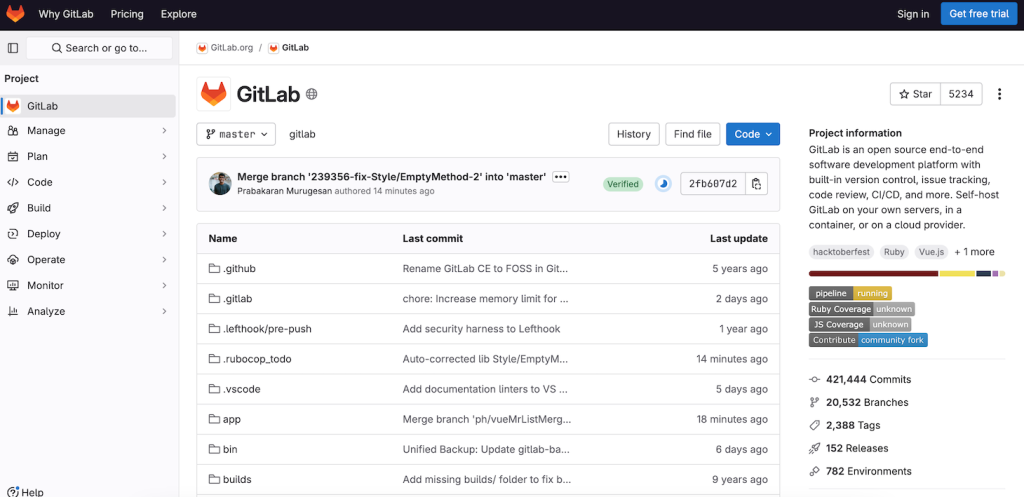What is GitLab? Main functions and use cases
Many digital business owners rely on DevOps to improve productivity through automation and collaboration. They commonly use a Git platform like GitLab to create a centralized repository, version control system, and continuous integration-continuous delivery (CI/CD) pipeline.
In this article, we will explain what GitLab is, including its main functions and benefits. You will also learn whether this platform fits your role and projects.
What is GitLab?
GitLab is an open-source Git repository platform. Like similar tools such as GitHub, it lets you store project codebases in a centralized location, enable version control for simpler tracking, and create branches for asynchronous development.

Unlike GitHub, you can self-host GitLab in your infrastructure as an internal repository. It improves security since you have full control and ownership of the tool.
Self-deploying GitLab private repositories also means you can benefit from your web host’s built-in features. For example, Hostinger GitLab hosting plans provide free automatic weekly backups, the Kodee AI assistant, and a malware scanner.

GitLab offers a free version, which is suitable for deploying personal and small projects. If you need advanced features like a CI/CD dashboard and user management tool, choose the premium plans starting at $29/month.
Main functions of GitLab
Here are GitLab’s main functions that can help improve your web development project efficiency.
Git Source Code Management (SCM)
GitLab allows developers to implement Git source code management (SCM) in their project development flow. This feature enables them to manage codebases more efficiently by using these functions:
- Version control. Git SCM constantly tracks code changes in your repository. This helps you revert problematic modifications more easily and enables you to work more freely without worrying about permanent damage to the project.
- Branching and merging. Developers can create a separate, isolated development line from the main codebase. It enables multiple people to make changes to the project simultaneously without altering the primary file.
- Conflict resolution. Git SCM automatically warns users when merging changes to the same lines of code, avoiding overlaps that might cause errors.
- Efficient collaboration. Multiple users can use Git SCM to collaborate more efficiently through parallel development and distributed workloads.
CI/CD pipelines
CI/CD is a methodology for automating the application development process, from testing to deployment. It makes the whole cycle more efficient and less error-prone, enabling developers to focus on the code and push new features quickly.
A pipeline is your project’s CI/CD flow, encompassing CI processes like testing and CD tasks like branch merging. GitLab provides a built-in CI/CD tool that lets you set up the pipeline and integrate it with other features like SCM more easily.
Moreover, GitLab’s Auto DevOps feature automatically detects your project structure and creates a CI/CD flow based on a template. GitLab CI/CD pipelines are also highly customizable and support multiple runners – agents that execute specific jobs.
Project management tools
Developers can use various GitLab project management features that help simplify planning, issue tracking, and work distribution. This functionality is especially useful for collaboration in a team environment.
For example, you can set a milestone to track progress towards a specific goal. A milestone is a group of issues and requests that developers must finish before a deadline to increase the progress percentage.
You can further organize milestones into a larger group called epics. These help you visualize project planning with a longer time frame, including cross-team collaborations.

The GitLab issue board is where you can check all the projects and their progress. You can set it up as a Kanban or Scrum board, which helps you visualize your project based on your preferred project management framework.
Security Features
GitLab security tools automatically scan your application code base throughout the entire development lifecycle to ensure its safety. Here are some of the notable ones:
- Static Application Security Testing (SAST). An automated scan that searches for known vulnerabilities in your application codebase.
- Dynamic Application Security Testing (DAST). GitLab simulates real-world cyber attacks on your running application to identify misconfigurations or issues that other tools couldn’t detect.
- Secret detection. GitLab scans for tokens or secret keys used for connecting external services in the committed code, preventing it from being pushed to the Git repositories.
- Dependency scanning. This feature scans for vulnerabilities in your application’s dependencies during the build process.
GitLab provides Security Dashboard and Security Center where you can check and resolve all vulnerabilities in your application more quickly.

Why Use GitLab?
Here are several reasons you should consider GitLab as a Git and collaboration platform for your projects.
Comprehensive DevOps platform
GitLab has many features that can help improve the efficiency of your entire development lifecycle, from issue creation to deployment. It minimizes the need for third-party tools, streamlining the workflow.
You can distribute tasks using GitLab’s project management tool, collaborate more efficiently with SCM, automate the process by creating a CI/CD pipeline, and track errors using the GitLab Performace Monitoring tool.
Efficiency
GitLab improves development efficiency by enabling real-time collaboration through branching and version control. You can also fine-tune the CI/CD pipeline according to your team workflow to further improve effectiveness.
A robust CI/CD and Git system helps you minimize issues by catching them earlier in the development lifecycle. It minimizes back-and-forth, improving delivery speed and accelerating project progress.
Open-source option
As GitLab is an open-source tool, you can modify the code directly to change this platform’s features or integrate it with internal services that are incompatible by default.

Open-source software also commonly fosters community engagement. For example, users can develop plugins, scrutinize the source code for potential vulnerabilities, and discuss issues to discover solutions more quickly.
Scalability
As a self-hosted platform, GitLab is easily scalable. You just have to use a GitLab hosting provider with powerful hardware and scalable plans to easily increase the server resources.
Pro tip
At Hostinger, upgrading your VPS only takes a few clicks and up to 10 minutes. Your files and configurations will remain unchanged since we will migrate them automatically.
GitLab is also horizontally scalable, meaning you can add more server instances to distribute the load. For example, you can set up the load balancer, monitoring tools, storage, and GitLab, each on a different VPS.
Who should use GitLab?
In this section, we will explain which roles would benefit most from using GitLab as their Git repository platform.
Individual developers
GitLab is a comprehensive platform for individual developers, providing features that streamline the entire software development lifecycle. This capability minimizes the need for third-party tools for a more centralized workflow.
Moreover, open-source and free software like GitLab is excellent for individual developers to save costs.
Teams
GitLab’s collaboration and project management features are excellent for team environments.
The Git SCM enables efficient parallel collaboration by providing a centralized repository, branching, and version control system. Moreover, the project boards allow all team members to track their development progress and distribute tasks more easily.
Enterprises
GitLab suits enterprises because it offers a comprehensive range of built-in security tools to ensure safety throughout the entire development phase. This is crucial since data breaches and vulnerabilities can harm the business’s reputation.
Also, GitLab’s robust CI/CD capability enables the rapid delivery of new features and improvements to meet market demand quickly.
Conclusion
GitLab is an open-source platform for Git repositories, commonly self-hosted on a private server as an internal tool. It offers various functions that help developers work more efficiently, including:
- Git SCM. GitLab uses Git to enable version control, branching, and conflict handling for more efficient collaboration.
- CI/CD pipeline. CI/CD pipeline in GitLab is highly customizable and utilizes multiple runners, allowing you to automate the entire development lifecycle to your needs.
- Project management tools. Developers can use multiple labels to track their progress accurately and divide tasks between team members using the issue board.
- Security tools. GitLab automatically scans your code base for vulnerabilities and simulates real-world cyber attacks to ensure project security.
Based on its functions, GitLab is a comprehensive DevOps platform that helps improve collaboration and development efficiency. It is suitable for all ranges of users, including individual developers, teams, and enterprises.
What is GitLab FAQ
How does GitLab work?
GitLab works similarly to other Git tools. It provides a source code management (SCM) tool that lets users store and manage their project codebase more efficiently. This platform also has a built-in project management feature and CI/CD tools for automation.
Is GitLab an open-source tool?
Yes, GitLab is an open-source tool. You can check its codebases from the official GitLab repository. GitLab is also completely free. However, several premium features like Advanced CI/CD are only available in the paid plan.
How is GitLab different from GitHub?
At their core, GitLab and GitHub are platforms for storing project repositories using the Git system. The main difference is that you can self-host GitLab in your own infrastructure for higher control and ownership. Conversely, GitHub is only available as an external, third-party platform.
